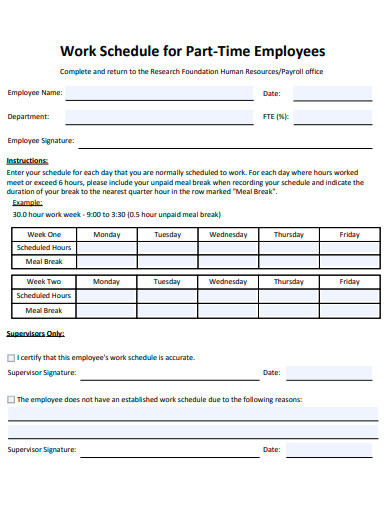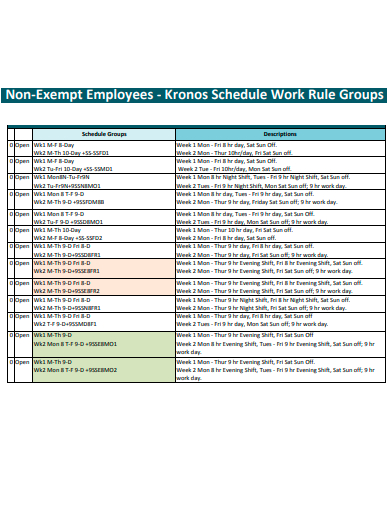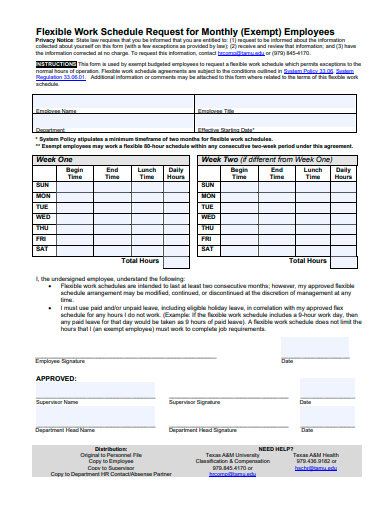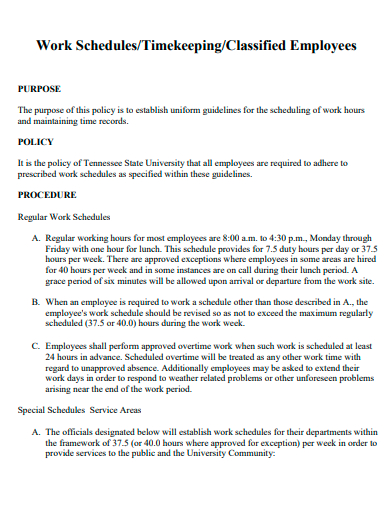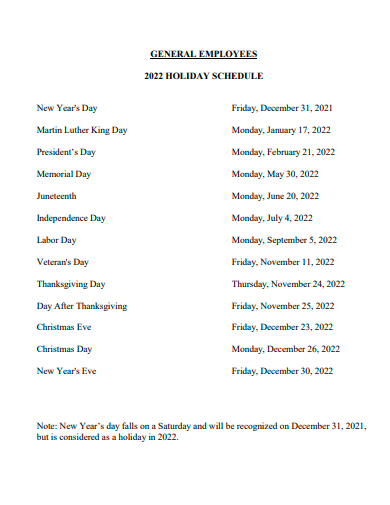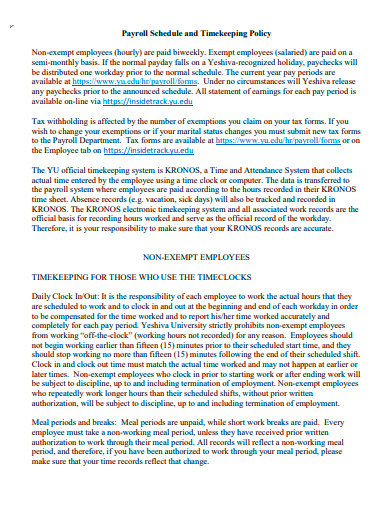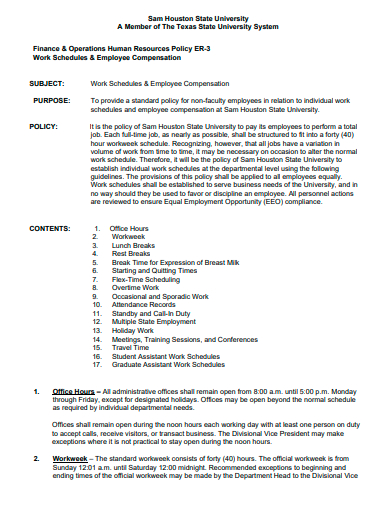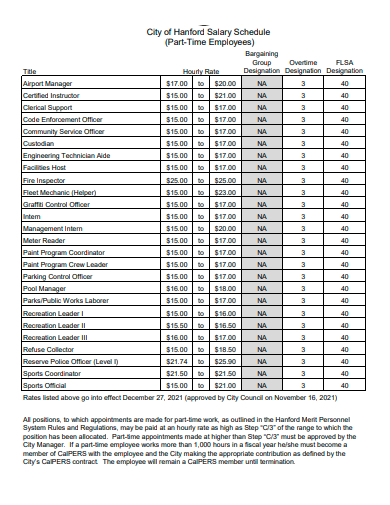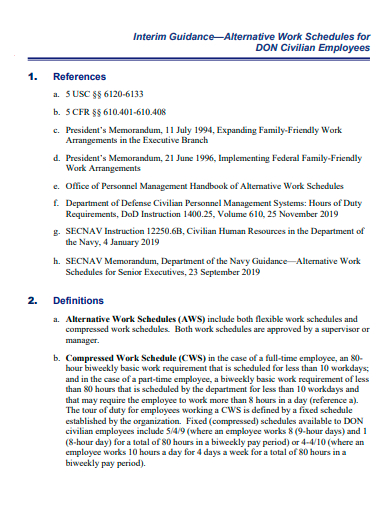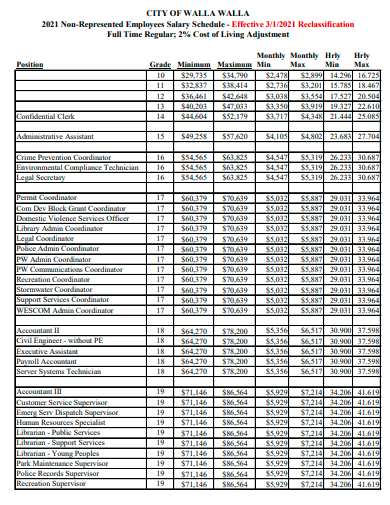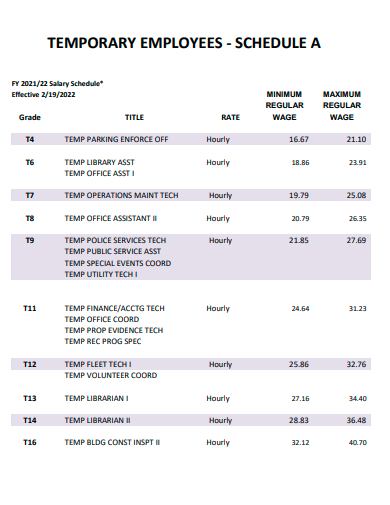The foundation of smooth and efficient company operations is well-planned work schedules. The most effective work schedule brings your organization’s many distinct moving elements together and organizes your old and new employees and your company. A seamless transition from one shift to the next is made possible by personnel scheduling in the hospitality, retail, healthcare, and information technology industries. You are establishing a framework for paid work, and defining operational hours for your organization is accomplished via the scheduling process. When developing productive work schedules, you have various options at your disposal, including using pen and paper, spreadsheets, or automated procedures such as employee scheduling software.
FREE 10+ Employees Schedule Samples
1. Part-Time Employees Work Schedule
2. Non-Exempt Employees Schedule
3. Employees Flexible Work Schedule Request For Monthly
4. Classified Employees Work Schedules
5. General Employees Holiday Schedule
6. Non-Exempt Employees Payroll Schedule
7. Employees Compensation Work Schedule
8. Part-Time Employees Salary Schedule
9. Civilian Employees Work Schedule
10. Non-Represented Employees Salary Schedule
11. Temporary Employees Schedule
What Are Employees Schedule?
The number of hours per day and the number of days per week that an employee is expected to work according to the terms of their employment contract is an employee schedule. An employee’s work schedule affects the compensation, duties, employee benefits, and requirements of labor law that apply to that employee. To accommodate the requirements of your long hours of operation, you can either develop a universal plan for your personnel or schedule them in shifts.
How To Make an Employee Schedule?
The schedule records any changes that may occur in the various jobs performed by each person assigned to a certain schedule. Your company needs to develop a standard employee schedule template to coordinate your employees’ work schedules and the responsibilities delegated to them. You can get started by reading the steps that are provided below.
Step 1- Build Shifts
You can allow your employees to select their work schedules by providing that option. You could inquire with them about their ideal shift schedule and then model the drafting of your work plan after their preferences. It helps your workers maintain their engagement in their work and is a terrific method to strike a balance between the demands of their personal and professional lives.
Step 2- Details To Include
Your employee schedule should include the following information, such as a week’s worth of days, employee names, the date of each day, and any other information you want to include. In addition, your employee schedule should include any other information you wish to include.
Step 3- Make a Schedule
Once you have all the information listed above, it is time to begin formatting your timetable chart. On the rear section of the schedule, including the names of the employees, the dates, the business hours of the company, and the contact information for the company. Therefore, the only information that is shown on the calendar is the shifts that are available to work as well as the work hours.
Step 4- Consider Federal Law
The requirements of the child labor law, which limit the amount of time minors under 18 can spend working, are the only federal legal requirements that apply to scheduling and the hours that an employee can be scheduled to work. There are no other federal legal requirements that apply.
What is the most effective schedule for alternating shifts?
One of the most effective shifting rotations goes in the opposite direction, clockwise. This rotational plan ought to contain at least three-night shifts in a row, followed by three days off for rest after completing the night shifts.
How significant is the importance of the staff schedule?
Employee scheduling allows you to allot shifts to employees and helps you track whether or not those shifts are being filled effectively.
What exactly are the three different kinds of scheduling?
The Capacity schedule, the Resource schedule, and the Service schedule are the names of the three different types of schedules. They can do things similar to one another, and in some contexts, more than one of them will be useful.
When you have finished making the weekly schedule, get it out to everyone as soon as possible. As a result, you will have plenty of time to make adjustments before the shifts go into effect because your employees will be able to let you know if they cannot work on particular shifts. This would prevent employees from engaging in the time-honored practice of “no call, no show” and prevent them from frantically searching for a replacement at the last minute. Employees will find that this makes it easier to work around their schedules at work and in their personal lives.
Related Posts
FREE 10+ On Call Schedule Samples in PDF
FREE 10+ Time Block Schedule Samples in PDF
FREE 10+ Gym Schedule Samples in PDF | MS Word | Apple Pages | Google Docs | Keynote |
FREE 10+ Daily Hourly Schedule Samples in PDF
FREE 10+ Weekly Schedule Template with Hours Samples in PDF
FREE 10+ 7 Day Weekly Schedule Samples in PDF
FREE 10+ Working Schedule Template Samples in PDF
FREE 6+ Preschool Schedule Template Samples in PDF
FREE 10+ Daily School Schedule Samples in PDF | MS Word | Google Docs | Google Sheets | Excel
FREE 10+ Day Schedule Samples in PDF
FREE 10+ Daily Work Schedule Samples in PDF
FREE 10+ 24 Hours Schedule Samples in PDF | Word | Google Docs | Google Sheets | Excel | Apple Numbers | Apple Pages
FREE 10+ Baseball Schedule Samples in PDF
FREE 10+ Availability Schedule Samples in PDF
FREE 10+ Weekly Cleaning Schedule Samples in PDF

